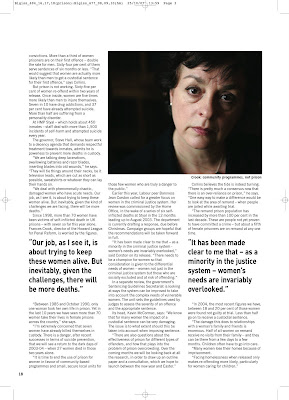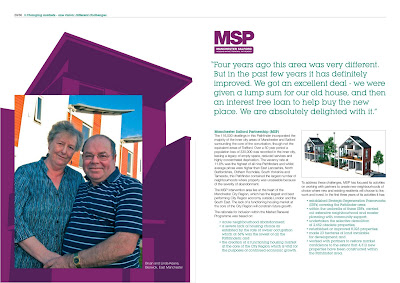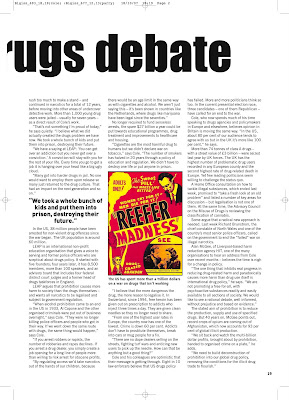From the Big Issue in the North:
Uncategorized
quality control
I wouldn’t like to have bought a house at The Way in Beswick – one of New East Manchester’s flagship new build housing estates….
From Inside Housing magazine:
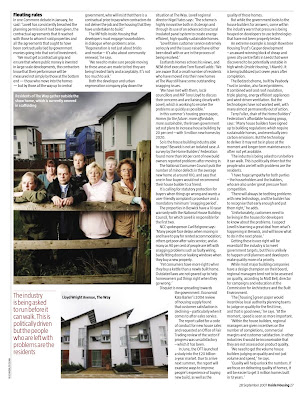 Interesting, then to read a rather breathless press release put out by the Pathfinder body itself just shortly before my story ran….New East Manchester has, it turns out, been honoured with the title of Regeneration Agency of the Year.
Interesting, then to read a rather breathless press release put out by the Pathfinder body itself just shortly before my story ran….New East Manchester has, it turns out, been honoured with the title of Regeneration Agency of the Year.
I’m not quite sure what the long-suffering residents I’ve been talking to would make of that. It’s a particular effort to keep a straight face as I get to this bit:
“Satisfaction levels of residents have improved significantly over the last seven years – within the NDC area in 1999 only 46% of residents were satisfied or very satisfied with their neighbourhood. The equivalent rate in 2005 was 68%. For the whole of East Manchester in 2005 the satisfaction rate was 69%.”
Hmmm. So Jonathan Cross et al (in the feature above), these guys, these and this lot must be isolated cases. Let’s hope that’s the case. I don’t doubt there is some sterling work being done, but there is a lot of bitterness out there about the quality of what’s being thrown up and the effect on long-established communities.
AS A marginally interesting aside, Brendan Nevin, architect of the Pathfinder regeneration scheme and a visiting professor at Salford University’s housing and urban studies unit, has just produced an update to Transition to Transformation – the pathfinder chairs’ submission to the government’s 2007 comprehensive spending review.
But it was the original report that caught my eye. On page 29 (see below) there is a case study focusing on New East Manchester and – you guessed it – they used The Way, in Beswick, as their example. This was while all the problems were rumbling on for the new residents.
If that’s not irony enough, there is something else.
Click on the jpeg below and take a good look at the lady they featured. Then, look again at the group photo on page two of my Inside Housing story, above.
Can you see it….second from the right?
Yes, the authors managed to use one of my outraged residents in literature talking up the development. Innocent mistake, but amusing nonetheless.
addictions and convictions
Following on from this, this piece is from the Big Issue in the North…
“even a dog is treated better”
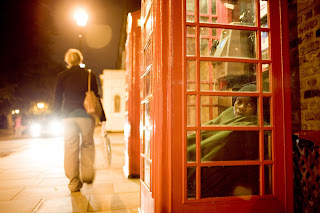
Refugees and asylum seekers made destitute through delays with the asylum system or having their cases rejected described their lives yesterday at a hearing in Manchester.
Men and women from Iran, Afghanistan, Pakistan, Somalia, Sudan, Democratic Republic of Congo, Zimbabwe, Uganda and Ethiopia were among those who spoke at the Independent Asylum Commission session, which focused on the issue of destitution.
Financial support, housing and access to free healthcare are withdrawn when an asylum seeker’s case is rejected – even when an appeal is pending. With no money and no legal right to work, many end up destitute – living on the streets or on people’s floors, and reliant on charities and faith groups. Many who end up in this situation are eventually granted leave to remain.
There are known to be upwards of 1,000 destitute refused asylum seekers in Greater Manchester alone, but they are an invisible population that few are aware of – including many politicians. Campaigners, including the support agency Refugee Action, believe government uses destitution as a deliberate tactic aimed at forcing them to go home.
The problem is that many would rather live with nothing in this country than face persecution and torture back home.
There was some harrowing testimony at the hearing, part of a national citizens’ enquiry into the system. The Commission’s report, out next year, will make recommendations for how the UK asylum system can be made fair and humane as well as effective.
- Selam, a refugee from Ethiopia told how she went through seven different solicitors, was detained and then made destitute after her appeal notification was sent to the wrong address in Bolton. She was finally granted refugee status in June – five years after her arrival. “I was always moving around, sleeping on my friends’ floors and sofas, and spent my days just walking, with nowhere to go,” she said. “I could get parcels of food and a small amount of money from a Red Cross drop-in. I have no words to explain what life was like for me. It was a miserable time.”
- Mary, from Uganda, told how she was imprisoned, beaten and repeatedly raped after a relative was discovered to have joined a rebel faction, but fled alone to Britain in 2003. In 2005, her asylum claim was rejected and she was turned out of her accommodation in Manchester and her benefits stopped. “It is worse than being an animal,” she said. “I rely on the Red Cross for food and have to sleep on people’s floors. Even a dog is treated better. I am educated and have a brain but am not allowed to work. I cry every day. I am terrified for the future.”
- A 70-year-old Somalian woman who speaks no English and suffers from arthritis and a gastric condition slept on friends’ floors and sofas and lived on vouchers for nine months while her case was processed.
- A 47-year-old torture survivor from Dafur told how slept at Manchester’s train and tram stations and in subways after being told to return to Sudan. His asylum case was eventually accepted.
- Flores Sukula, 21, from the DRC, described how eight members of her family – including her six-month-old sister – were left destitute in Bolton after their case was rejected. They were left with £30 a week to survive on. This year the family made a fresh application and their support was restarted. They are still waiting for the outcome. Flores said: “I didn’t feel like a human being. They treat animals better than we were treated. My dad just wanted to work so we could take care of ourselves.”
- And a Zimbabwean teacher – who quit her homeland after being forced to work as an election monitor during rigged polls – broke down in tears as she told how immigration officers broke down her door in the early hours of one morning, hand-cuffed her and dragged her half-dressed into their vehicle. She spent several weeks in detention before finally being released.
Dave Smith, of Manchester’s Boaz Trust, whose members put up destitute people in their own homes, told how he had known nine-months-pregnant women to be released from jail and onto the streets. Boaz is currently housing 28 people, but has more than 170 more on its waiting list. Desperate people have walked all the way from Wigan to Manchester (about 20 miles) in order to pick up food parcels.
Ruth Heatley, solicitor with Greater Manchester Immigration Aid Unit, said she knew of whole families subsisting on £38 a week of state benefits. She added that it was unlikely that destitute asylum seekers would access emergency support in the form of food vouchers without proper legal representation – but the number of lawyers doing immigration has plummeted due to changes in the funding system.
Nigel Rose, manager of Refugee Action Manchester, does not call for an amnesty or an open borders policy. All he wants is for refugees and asylum seekers to be treated with dignity and given some support, until their case is fully dealt with.
“Far from encouraging refused asylum seekers to return home, destitution has the opposite effect. It means the government loses contact with asylum seekers, who enter a cycle of poverty, fear, hunger and mental and physical deterioration. Each day they are destitute, the chances of return become more remote,” he said.
“Instead, the government should maintain contact with refused asylum seekers and work with them to resolve their cases.”
postscript: The MEN’s story on it…the misplaced apostrophe in the headline is nothing to do with me though. No doubt there’ll be some vicious comments under that story by later today.
pps
The Independent splashed on this story today…better late than never, I guess
star turn

The fantastic Salford Star came runner-up in this year’s Paul Foot award – a prize for the country’s finest investigative and campaigning journalism. This is the second time the Star has come close to the prize – last year it appeared on the long-list.
In the words of industry journal, Press Gazette: “The final nomination was for the Salford Star publication, a free magazine for Salfordians which the judges said had ‘so irritated’ Salford Council for its ‘dogged and proactive approach’ that the Council blocked its funding applications and removed minutes from its website to stop the Star reporting on council decisions.”
The winner was announced yesterday – the prize was given to David Leigh and Rob Evans, of The Guardian, who exposed the issue of bribery within the British arms industry, notably BAE.
I think it’s a shame more regional papers don’t do proper investigations anymore but staff cuts mean most reporters feel like they’re virtually chained to their desks, churning out press releases. Isn’t that what the media is there for: holding those in power to account?
And then I sometimes wonder about the issue of self-censorship – after all a lot of local papers rely on councils, statutory bodies and big companies for advertising…for some, this could be a compelling reason not to dig too deeply. It’s may just be easier to play it safe.
state of confusion
Far be it for me to claim journalists should never change their minds. But I think the team at Independent News and Media are seriously confused. (And it is now just one team putting out the weekday and Sunday versions so I don’t think the ‘separate identity’ argument comes into it)
The Independent, 15/10/07:

Two stories, seven months apart, calling for wildly different approaches to the issue of drugs. The Independent has gone to great lengths to turn itself into a campaigning “viewspaper”, so these contradictory standpoints are both backed up with editorial – for the upgrading of cannabis here and the legalisation of all drugs here.
I for one am with the second viewpoint – one which seems to be gaining support in some of the least likely places. Richard Brunstrom, chief constable of North Wales Police and a man the tabloids love to hate, today persuaded his police authority to support his calls for a repeal of drugs prohibition.
You don’t need to be an expert to see drugs are everywhere – at all level of society – and that it’s prohibition and not use itself that leads to people committing crime and putting themselves and others at risk in order to get or sell them.
Surely, age restrictions and licensed sale is the answer to the criminality and violence that can currently come with them. Plus proper treatment and counselling for those who are addicted...
owch
The Merseyside Pathfinder, New Heartlands, was in the spotlight again yesterday, for all the wrong reasons.
The Telegraph’s environment editor, Charles Clover, didn’t mince his words when he wrote about the latest development in the council’s campaign to bulldoze 400 perfectly good homes in the Edge Lane neighbourhood of Liverpool.
“So prepare to be disgusted. Today, English Partnerships and Liverpool Land began the process of persuading a new public inquiry inspector that a compulsory purchase order – seemingly identical to the one that was rejected – should now be approved….
“The streets where Ms Pascoe lives have been kept deliberately by the council in a boarded up state which gives the impression of dereliction and decay. Meanwhile the faceless bureaucrats who laid the order draw their salaries and sleep soundly at night. This is a national disgrace….
“Ms Pascoe’s solicitor has already called English Partnerships’ determination to persist in the teeth of an adverse High Court judgement ‘oppressive and reckless.’
“MPs might care to ask why another £2 million of public money is to be poured away cynically on such poor legal grounds, clearly in the hope that the protracted struggle now begun either kills its opponents or by reducing them to penury forces them to sell up….”
It often seems to me that about the only people who agree with this so-called development project are politicians and housing developers. Few academics seem to be on its side and residents most certainly aren’t. I bet Pauline Davis isn’t happy.
reunited at last
 Simon Lok is one of the lucky ones. His compatriot, Mende Nazer, ended up in slavery in London. Many others wind up destitute on the streets of cities across the UK.
Simon Lok is one of the lucky ones. His compatriot, Mende Nazer, ended up in slavery in London. Many others wind up destitute on the streets of cities across the UK.
the secret war
Just briefly, Independent columnist Johann Hari has written a fascinating report exposing “France’s secret war“.
A country most people have never heard of – the Central African Republic – has been brutalised for generations by French-backed despots, apparently with the intention of securing its rich natural assets for French companies.
Earlier this year, the French military bombed the remote city of Birao, in attacks which failed to attract any attention in Europe.
He writes: “To get here, you have to travel for eight hours on a solitary UN flight that leaves once a week, carrying eight passengers at most, and then ride on the back of a rusting flat-top truck for an hour along ravaged and broken roads. It is hard to know when you have arrived, because you are greeted by emptiness and silence. What has happened here?
“…As Mahmoud and Idris talk into the night, it is getting dark, and a suffocating blackness and silence falls on the city. There is no electricity and no moonlight. They explain in this blackness that the French-backed troops began firing and the French military began bombing in March for one reason: the desperate locals had begun to rise up against President Bozize, because he had done nothing for them. People here were tired of the fact “there are no schools, no hospitals, and no roads,” they explain. “We are completely isolated. When it rains, we are cut off from the world because the roads turn to mud. We have nothing. All the rebels were asking was for government help.”
Why is it that the bombing and exploitation of some countries attracts the attention of peace and human rights campaigners, yet other nations just don’t seem to register?
Is it because CAR is in Africa, and there are so many troubled countries on that continent that people subconsciously switch off? Is it because they are brown? or poor? or more disenfranchised than some other countries because they are so much less developed?
Who knows, but I’m troubled that I’ve only heard about what’s happening there so very late.
falling men
I just watched The Falling Man, a harrowing documentary which looks at the imagery of 9-11 and tries to uncover the identities of those who may have jumped out of the twin towers. It is very powerful and humane…I recommend you take the time to watch it.


